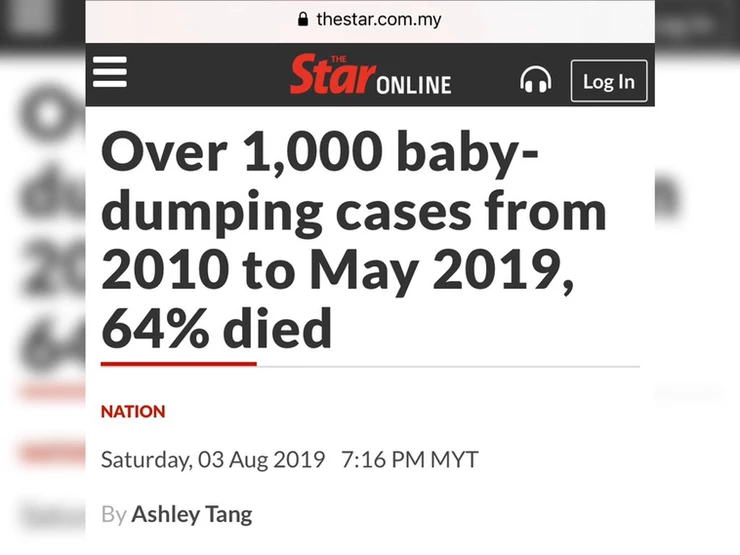Teen Pregnancies and ‘baby dumping’ in Malaysia: We are failing to protect our teenagers.
I refer to the article “Teen mum throws newborn from fourth floor flat, baby girl survives” published on May 13. In the first news, it was reported that the 18-year-old allegedly threw her newborn out of the balcony of a fourth floor flat to prevent her parents from discovering that she had just given birth. In fact, none of her family members were aware that she was pregnant all this while.
While one may feel angered by the suspect’s action, I ask for one to empathise with the perspective that she may be, in extreme fear, probably depressed and worried too that her family will find out that she had an unintended pregnancy.

In fact, a cross-sectional study on postpartum depression (PPD) among 347 Malaysian women had just given birth revealed that the prevalence of PPD was 31.7%. From the study, women with unplanned pregnancies were 2.3 times more likely to experience PPD compared to those who had planned pregnancies. Additionally, it also found that women who had no or less childbirth experience were three times more likely to experience PPD.
While there are many families who would care for their pregnant teen daughters, niece or granddaughters, not many are as kind and supportive. If a young girl is unmarried and pregnant, she can be shunned, discriminated, and even disowned by her family and community. When families find out about the pregnancy, many send them away to half-way homes until the pregnancy is due. The stigma faced by an unmarried pregnant girl is one that has lifelong impact.
According to the National Health and Morbidity Survey (2017), the prevalence of Form 1 – Form 5 students who had ever had sex was 7.3%; male 8.8% and female 5.8%. In other words, out of 100 Form 1 – Form 5 students surveyed, 7 were sexually active. Apart from that, statistics show that on average, annually, between 13,000 to 18,000 teens are pregnant, and up to 1,000 babies are abandoned.
Despite countless of news reports in the past about teen girls – who in fear of the society’s stigma, had resorted to endure labor pain alone to give birth secretly in toilets, it is mind boggling that we as a society not only condemn them for their actions, but we refuse to acknowledge that young people are ill-equipped with essential knowledge and skills on sexual and reproductive health to protect themselves. In fact, we continue to take an overtly moralistic approach in addressing teenage unintended pregnancies and baby dumping, and expect that by moral policing and abstinence-based education, these issues can be resolved.
Unfortunately, we are fighting the same battle to reduce unintended pregnancies, baby dumping and unsafe abortion with opposing strategies. Anti-choice and strong proponents of abstinence-based sexuality education are against those who advocate for Comprehensive Sexuality Education (CSE).
There are many misconceptions that the society holds about CSE, among them that sex education encourages young people to have sex, teaches them the ways to do so, and it undermines or disregards values and morals. Many also think that sex is not a topic to be discussed by children, and we can protect them by not discussing about it.
Contrary to these myths however, the World Health Organization (WHO), sexual and reproductive health organisations, and other research institutions in peer-reviewed literature have demonstrated that CSE that teach both abstinence and contraception delay the age of first sex or sexual initiation. Additionally, the International Technical Guidance on Comprehensive Sexuality Education states that depending on the culture and values held by communities, CSE should involve key values central to the relevant religious and cultures, because our religious beliefs will inform what we do with the knowledge we possess.
It is worth noting that the heaviest burden of this lack of knowledge and unmet needs in contraceptives fall on young girls, because they are the ones who get pregnant and are often left alone to deal with the consequences. However, in our efforts to prevent unintended pregnancies among young people, it is also important to involve young men, especially to improve their ability to make informed choices and responsible decisions with regards to their sexual and reproductive health. In fact, in many cases where teen girls are expected to be married off to their partner or perpetrators who have sexually abused or raped them, a UNICEF paper on Child Marriage in Malaysia states that it does not only affect their opportunity to complete or further their education thus undermining their socio-economic status, but young girls are at higher risk of experiencing domestic violence and have higher probability of divorce and separation.
It is therefore high time that the Government, specifically the Ministry of Health, the Ministry of Women, Family and Community Development, and the National Population and Family Development Board (NPFDB) review the country’s sexual and reproductive health care services and policies to strengthen primary, secondary and tertiary prevention strategies. When we can provide youth-friendly and non-judgemental health care services, young people will have a safe space to come forward for contraceptives, emergency contraception, safe abortion, screening and treatment for sexually transmitted infections, reproductive cancers, support to overcome sexual violence, as well as comprehensive information on sexual and reproductive health.
Apart from that, in view of the recent closure of NPFDB’s Nur Sejahtera clinics throughout the country deemed as “non-essential services” during the Movement Control Order (MCO), the Government should take serious consideration on the impact of COVID-19 on sexual and reproductive health, especially on girls and women in Malaysia.
Globally, UNFPA and its partners estimate that as a result of COVID-19, 47 million women may not be able to access to modern contraceptives, resulting in seven million unintended pregnancies.
In Malaysia, the Contraceptive Prevalence Rate (CPR) for modern methods of contraception is 39%; and for any method of contraception, 53%. One out of 5 woman of reproductive age, either married or in union, would like to stop or delay childbearing but are not using any method of contraception. Additionally, a nationwide cross-sectional study revealed that the prevalence of unintended pregnancy was 42.9% among Malaysian women in postpartum. As Dr Hamizah Mohd Hassan, Head of Health Unit (NPFDB) projects that Malaysia is expected to have a baby boom in January 2021, a pandemic-preparedness policy on sexual and reproductive health plays an essential role to ensure that families, women and girls have access to contraceptive and other essential sexual and reproductive health services in the time of COVID-19 pandemic.
Finally, it is my earnest hope that even though in anger, that as a society, we will open our hearts, and empathise with young people going through the difficulties of experiencing unintended pregnancies, since this is a result of our failure to protect them. And today, let’s take action to educate ourselves about Comprehensive Sexuality Education.






